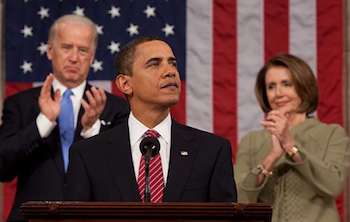- MENU
- HOME
- SEARCH
- WORLD
- MAIN
- AFRICA
- ASIA
- BALKANS
- EUROPE
- LATIN AMERICA
- MIDDLE EAST
- United Kingdom
- United States
- Argentina
- Australia
- Austria
- Benelux
- Brazil
- Canada
- China
- France
- Germany
- Greece
- Hungary
- India
- Indonesia
- Ireland
- Israel
- Italy
- Japan
- Korea
- Mexico
- New Zealand
- Pakistan
- Philippines
- Poland
- Russia
- South Africa
- Spain
- Taiwan
- Turkey
- USA
- BUSINESS
- WEALTH
- STOCKS
- TECH
- HEALTH
- LIFESTYLE
- ENTERTAINMENT
- SPORTS
- RSS
- iHaveNet.com: Politics
by Jules Witcover

President Obama
Of all of President Obama's recent musings, none seems more fanciful than his observation in an
He went on: "There's a tendency in Washington to think that our job description of elected officials is to get re-elected" -- about as callous a comment about his chosen profession as you might get from the most cynical naysayer. "That's not our job description," he assured Sawyer. "Our job description is to solve problems and to help people."
The implication of the one-term remark, however, is that Obama is willing to throw self-serving politics to the winds to achieve his major goals, which would really be a quite remarkable change for us to believe in if it were true.
If Obama were to be taken literally at his word, we could expect him first of all to act decisively on his campaign promises to end the wars in Iraq and Afghanistan and pull out of both places. Instead, he is adhering essentially to the gradual withdrawal from Iraq and another troop surge in Afghanistan.
And at home, we might expect him to go all-out to put the millions of unemployed Americans back to work with much heavier federal spending job-creating and badly needed public works. But neither of those go-for-broke policies is in the cards.
In fairness to Obama, his answer was prompted by this odd question: "Ever in the middle of all that's coming did you think maybe one term is enough?" It was a strange inquiry to a 48-year-old president of apparently excellent health and energy only one year into his
Most politicians who enter the field are not driven exclusively by personal ambition and have agendas they wish to advance, and few are willing to settle for a single term to achieve them. For one thing, at the presidential level certainly, the scope of challenges faced has broadened so much that four years is hardly long enough to deal effectively with all of them.
So beyond Obama's talk of preferring to be "a really good one-term president" than a mediocre two-termer, there doubtless is a realistic understanding that to succeed he will have to deal more effectively with the political realities of the Washington in which he is serving his first term.
After one year in the Oval Office the reality exists, not simply in any hope of reelection in 2012 but in looking to next November's midterm elections, of having to do business somehow with the Republican minority that has already begun to erode his party's congressional majority. And that means, for openers, some accommodations on health-care reform and other key Obama initiatives to the few Republican senators who might break ranks from the Party of No.
The practical fact is that nothing is more likely to lead to a second presidential term than an effective first term, though Bill Clinton for one demonstrated after his first-term setback on health-care and other matters including impeachment that reelection was still achievable.
Democratic liberals who supported Barack Obama over Hillary Clinton in the 2008 primaries and then backed him heavily in his election with the hope of returning progressive politics to the country may be heartened by his words about first-term urgency.
But coming at the time of loss of a filibuster-proof
Enlistment of his 2008 campaign manager, David Plouffe, to fire up the grassroots and presumably the netroots energy that elected him and preserve his congressional majority this fall, suggests his awareness of the political peril ahead in the second half of his first term.
With three years still to go, there's plenty of time to build a good record and be perceived to have been a good first-term president. Even if he hasn't done so, there will be all the more reason to expect that in 2012 he will press on for a second term.
Available at Amazon.com:
I.O.U.: Why Everyone Owes Everyone and No One Can Pay
The Political Fix: Changing the Game of American Democracy, from the Grassroots to the White House
AMERICAN POLITICS
WORLD | AFRICA | ASIA | EUROPE | LATIN AMERICA | MIDDLE EAST | UNITED STATES | ECONOMICS | EDUCATION | ENVIRONMENT | FOREIGN POLICY | POLITICS
Receive our political analysis by email by subscribing here
Obama: On Being a One-Term President | Jules Witcover
© Tribune Media Services